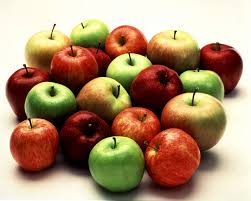 The phytonutrients in apples can help you regulate your blood sugar. Recent research has shown that apple polyphenols can help prevent spikes in blood sugar through a variety of mechanisms. Flavonoids like quercetin found in apples can inhibit enzymes like alpha-amylase and alpha-glucosidase. Since these enzymes are involved in the breakdown of complex carbohydrates into simple sugars, your blood sugar has fewer simple sugars to deal with when these enzymes are inhibited. In addition, the polyphenols in apple have been shown to lessen absorption of glucose from the digestive tract; to stimulate the beta cells of the pancreas to secrete insulin; and to increase uptake of glucose from the blood via stimulation of insulin receptors. All of these mechanisms triggered by apple polyphenols can make it easier for you to regulate your blood sugar.
The phytonutrients in apples can help you regulate your blood sugar. Recent research has shown that apple polyphenols can help prevent spikes in blood sugar through a variety of mechanisms. Flavonoids like quercetin found in apples can inhibit enzymes like alpha-amylase and alpha-glucosidase. Since these enzymes are involved in the breakdown of complex carbohydrates into simple sugars, your blood sugar has fewer simple sugars to deal with when these enzymes are inhibited. In addition, the polyphenols in apple have been shown to lessen absorption of glucose from the digestive tract; to stimulate the beta cells of the pancreas to secrete insulin; and to increase uptake of glucose from the blood via stimulation of insulin receptors. All of these mechanisms triggered by apple polyphenols can make it easier for you to regulate your blood sugar.
Even though apple is not an excellent source of dietary fiber (it ranks as a “good” source in our WHFoods Rating System), the fiber found in apple may combine with other apple nutrients to provide you with the kind of health benefits you would ordinarily only associate with much higher amounts of dietary fiber. These health benefits are particularly important in prevention of heart disease through healthy regulation of blood fat levels. Recent research has shown that intake of apples in their whole food form can significantly lower many of our blood fats. The fat-lowering effects of apple have traditionally been associated with its soluble fiber content, and in particular, with its fat-soluble fiber called pectin. What we now know, however, is that whole apples only contain approximately 2-3 grams of fiber per 3.5 ounces, and that pectin accounts for less than 50% of this total fiber. Nevertheless, this relatively modest amount of pectin found in whole apples has now been shown to interact with other apple phytonutrients to give us the kind of blood fat lowering effects that would typically be associated with much higher amounts of soluble fiber intake. It’s not fiber alone that explains the cardiovascular benefits of apple, but the interaction of fiber with other phytonutrients in this wonderful fruit. If you want the full cardiovascular benefits of apples, it’s the whole food form that you’ll want to choose. Only this form can provide you with those unique fiber-plus-phytonutrient combinations.
The whole food form of apples is also important if you want full satisfaction from eating them. Researchers have recently compared intake of whole apples to intake of applesauce and apple juice, only to discover that people report less hunger (and better satiety, or food satisfaction) after eating whole apples than after eating applesauce or drinking apple juice. But especially interesting was an additional finding about calorie intake following apple consumption. When healthy adults consumed one medium-sized apple approximately 15 minutes before a meal, their caloric intake at that meal decreased by an average of 15%.
Scientists have recently shown that important health benefits of apples may stem from their impact on bacteria in the digestive tract. In studies on laboratory animals, intake of apples is now known to significantly alter amounts of two bacteria (Clostridiales and Bacteriodes) in the large intestine. As a result of these bacterial changes, metabolism in the large intestine is also changed, and many of these changes appear to provide health benefits. For example, due to bacterial changes in the large intestine, there appears to be more fuel available to the large intestine cells (in the form of butyric acid) after apple is consumed.
Apples belong to the Rose family of plants and are joined in that family by a wide range of very popular foods, including apricots, plums, cherries, peaches, pears, raspberries, and almonds. Foods in the Rose family are simply too diverse in their nutrient value to allow for any one single recommendation about the number of servings that we should consume from this family on a weekly basis. However, when focusing specifically on apples, several anti-cancer studies show daily intake of this fruit to provide better anti-cancer benefits than lesser amounts. So there may be some truth to that old phrase, “An apple a day keeps the doctor away!” Still, we don’t recommend that everyone eat one apple on a daily basis, given the wide variety of available fruits and the nutritional uniqueness of each type. But we do recommend that everyone eat at least 2-3 whole fresh fruits per day, or the equivalent of 2-3 cups’ worth of fresh fruit. Within this framework, if apples are a type of fruit that you strongly prefer, there would be nothing wrong with consuming one on a daily basis, and you may get some special health benefits by doing so.
